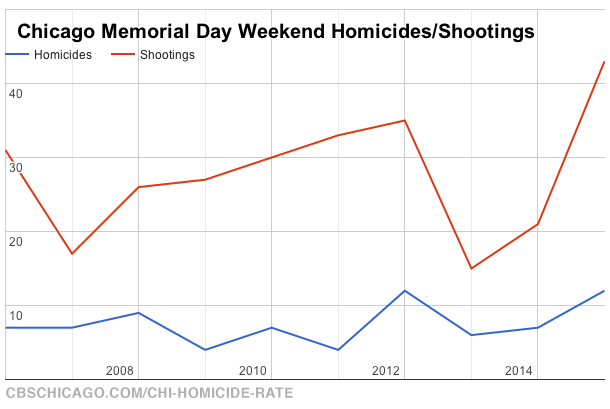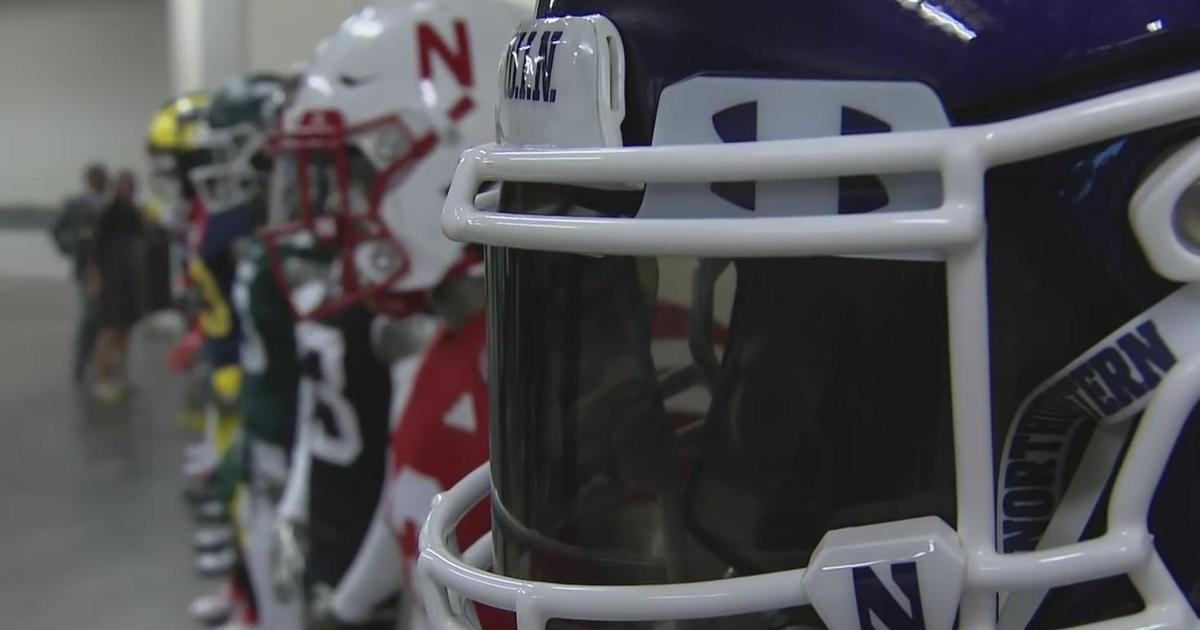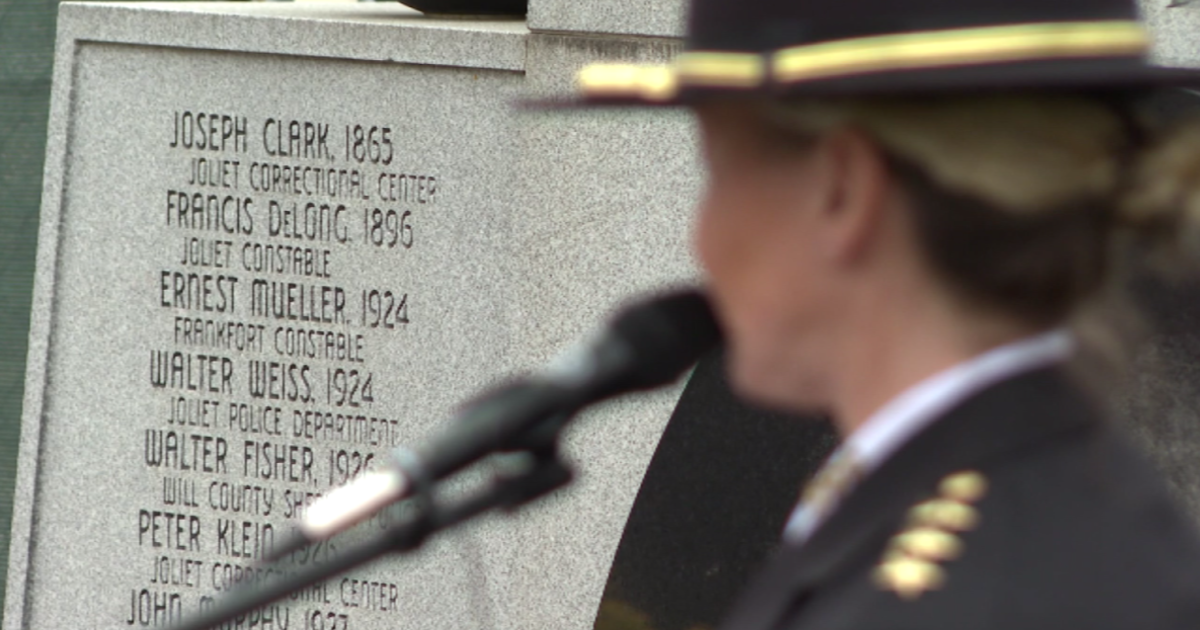What The Most Violent Memorial Day Weekend In Over A Decade Means For Chicago
The views expressed on this page are those of the author, not CBS Local Chicago or our affiliated television and radio stations.
Updated: 5/27/2015, 9:42 a.m.
It's easy to look at this year's Memorial Day weekend -- in which 12 people were killed and at least 43 were wounded in shootings -- and to write it off as average, a handful of violent days in a violent city.
But that would be a mistake.
Four days, as violent as they are, don't define a city or its violence. Before we write this weekend -- and Chicago -- off, we should gather more context.
RELATED: Cook County Commissioner Wants Shooters Charged As Domestic Terrorists
While it may have felt like a typical, violent weekend in Chicago for you, the numbers might prove otherwise. If anything, it's not typical, it's an outlier. It was the most violent Memorial Day weekend in over a decade. While 2012 also saw 12 homicides, it had fewer shootings. Few Memorial Day weekends come close to 2014's and 2012's numbers. 2011 only saw four homicides, which was lower than average. 2013 and 2014 saw six and seven homicides respectively, which falls squarely in the average range for Memorial Day weekend.
In fact, few summer weekends reach this many homicides. There's typically a couple weekends like this a year, like last year's July 4th weekend which saw 14 homicides, but this is far from the norm.
Also, it seems the theory that nice weather leads to a rise in violence in Chicago doesn't quite hold up in this instance. Looking at weather reports from the past decade, most Memorial Day weekends range from the 60s to the low 80s and rarely see a substantial amount of rain. So if nice weather truly did affect the number of homicides, most of the Memorial Day weekends from the past decade would be as bad as this year's.

From the outside, Chicago violence has seemed so bad, even Detroit took a jab at us last week... Which took courage, considering their homicide rate is typically three times higher than ours (but hey, don't be too hard on them).
When you look at total homicides in Chicago through May 25th, 2015 is about 14 percent higher than 2014, with 158 homicides in 2015 and 139 homicides in 2014. It's higher than 2013 and 2011 too, though lower than 2012, which had 207 homicides through May 25th. Yearly totals mirror these numbers, with 2012 logging 503 murders by the end of the year, more than 2013 and 2014, which logged 414 and 407 murders respectively.
And of course, there have been significant decreases in homicides since the 1990s. So far, 2015 is on track to have a homicide total in the mid-400s, half the number of homicides in 1995 (828).
But I'm not saying we should settle for 400 to 500 homicides a year just because the 1990s saw far worse numbers. To be honest, these normalized and stagnant statistics are definitely worrisome, especially when compared to Los Angeles and New York city, which have had much more success reducing homicides than Chicago. Sure, Chicago's homicide rate per capita isn't high enough to put it in the list of the most violent cities in the country, but it's still embarrassing that our homicide totals rise above the only two cities larger than us.
So what makes Chicago unique?
The Chicago Police Department and Mayor's office have laid much of the blame on guns in the past. In a report CPD commissioned from the University of Chicago Crime Lab, it was revealed that Chicago confiscates significantly more guns used in crimes than Los Angeles and New York city. The report also highlights that the police forces of all three cities are comparable in size, and that most other non-gun crimes have similar statistics -- portraying guns as the outlier.
"It is not just about how many police you have," Mayor Emanuel stated at a luncheon honoring police officers yesterday. "It is about the quantity of guns that are on the street so we actually have gun laws that back up the men and women we just recognized."
Sure, guns are a big part of the picture, but they aren't the only part.
The oft-repeated truth is that these homicides are in a small handful of neighborhoods that lack necessities -- education, jobs, healthy food -- that the rest of us take for granted. For a lot of us (as sad as we get when we see these numbers), the homicides happening in these neighborhoods aren't a reality -- they're a number on the television, or in the article we're reading. At some point, our shock will dissipate and we'll move on with our homicide-free lives as the violence continues in neighborhoods we rarely visit. This mentality, which is easy to fall into, makes it that much more imperative that we understand the context of weekends like these, and what the city is and isn't doing to stop overall violence.
Mayor Emanuel sort of acknowledged this too, stating that community involvement is critical to combating street violence.
Do those comments strike a nerve with anyone else? Comments from the Mayor about coming together as a community to stop street violence aren't only aimed at the communities suffering from the violence, but those that aren't. They're meant for the middle class individuals -- like me -- that may be ignorant of these communities' plights. At face value, they're innocent quips, why shouldn't communities come together to improve themselves? But they also run the risk of reaffirming outsiders' assumptions that these communities aren't lacking in resources from a city that has too often forgotten about them, but are just incapable of solving their own problems.
RELATED: Chicago's 'Most Violent Neighborhood' Is On The Rise, Offers More Than Just Homicide Statistics
If the Mayor is serious that communities need to band together to end violence, then he needs to give them the resources they need to do so. Don't just lay the responsibility on their shoulders, give them the tools they need too.
And to be fair, the city has had some success combating violence without having to lean on the police or tougher gun laws. Recent summer jobs programs for teens have shown promise, for example. But until the city proves that community programs deserve as much dedication (cash) as attempts to lure businesses to Chicago and efforts to beautify downtown for tourists, until the city actually dedicates itself to developing the neighborhoods hit hardest by violence, the violence will continue.
Mason Johnson is a Web Content Producer for CBS Chicago. You can find him on Twitter.
Sources: City of Chicago Data Portal, RedEye Homicide Tracker



